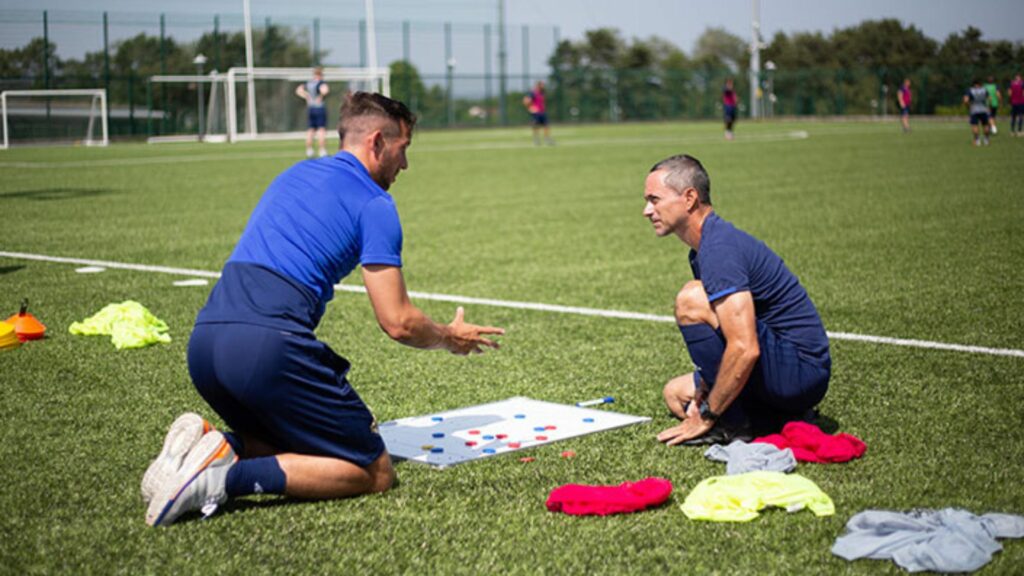“Football Coaching Strategies in Germany: A Deep Dive
Related Articles Football Coaching Strategies in Germany: A Deep Dive
Football Coaching Strategies in Germany: A Deep Dive

Germany has long been a powerhouse in the world of football, consistently producing top-tier players, innovative coaches, and successful teams at both the club and international levels. This success is not accidental; it is the result of a well-developed footballing culture, a strong emphasis on youth development, and a constantly evolving approach to coaching strategies.
Historical Context and Evolution
German football coaching has undergone significant transformations over the decades. In the past, a more rigid, disciplined, and physically demanding approach was common. However, in recent years, there has been a shift towards a more dynamic, tactical, and player-centered approach. This evolution has been influenced by several factors:
- Influence of Foreign Coaches: Exposure to coaching philosophies from other countries, such as the Netherlands and Spain, has broadened the tactical horizons of German coaches.
- Technological Advancements: The use of data analytics, video analysis, and sports science has enabled coaches to gain deeper insights into player performance and game dynamics.
- Emphasis on Youth Development: The German Football Association (DFB) has invested heavily in youth academies and coaching education, fostering a new generation of technically skilled and tactically astute players.
Key Coaching Philosophies
Several key coaching philosophies underpin the German approach to football:
- Tactical Flexibility: German coaches prioritize tactical flexibility, enabling their teams to adapt to different opponents and game situations. This often involves using formations that can seamlessly transition between attacking and defensive shapes.
- Pressing and Counter-Pressing: "Gegenpressing," or counter-pressing, is a hallmark of German football. This involves immediately pressing the opponent after losing possession, aiming to win the ball back in the opponent’s half and create scoring opportunities.
- Positional Play (Positionsspiel): Influenced by the Dutch and Spanish schools of thought, positional play emphasizes maintaining possession, creating passing lanes, and exploiting space on the field. Players are encouraged to make intelligent movements off the ball to support their teammates.
- High Intensity: German teams are known for their high work rate and physical endurance. Coaches emphasize the importance of pressing, running, and tackling throughout the match.
- Mental Strength: Developing mental resilience, focus, and determination is considered crucial. Coaches work to instill a winning mentality in their players, encouraging them to overcome challenges and perform under pressure.

Specific Coaching Strategies
German coaches employ a range of specific strategies to implement their philosophies:
- Formation and System: The 4-2-3-1 formation has been widely adopted in German football due to its balance between attack and defense. However, coaches also utilize other formations, such as 3-5-2, 4-3-3, and 4-4-2, depending on the strengths of their players and the tactics of their opponents.
- Pressing Triggers: Coaches identify specific triggers that initiate the pressing action. These triggers may include a poor pass, a heavy touch, or a player being isolated in a certain area of the field.
- Passing Patterns: German coaches emphasize the importance of precise and purposeful passing. They develop specific passing patterns and combinations to create attacking opportunities and break down defensive lines.
- Set-Piece Strategies: Set-pieces are a crucial aspect of German football. Coaches dedicate significant time to developing attacking and defensive routines for corners, free kicks, and throw-ins.
- Individual Development Plans: Coaches create individualized development plans for each player, focusing on their specific strengths and weaknesses. These plans may include technical drills, tactical exercises, and physical conditioning programs.
Youth Development
Youth development is the foundation of German football’s success. The DFB operates a network of youth academies and training centers across the country, providing young players with high-quality coaching and facilities.
- Early Specialization: While encouraging participation in various sports at a young age, German football emphasizes early identification and development of talented players.
- Holistic Development: Youth coaches focus on the holistic development of players, encompassing technical skills, tactical understanding, physical conditioning, and psychological resilience.
- Game Intelligence: Developing game intelligence is a key objective of youth coaching. Players are encouraged to make smart decisions on the field, anticipate opponents’ movements, and adapt to changing game situations.
- Qualified Coaches: The DFB provides extensive coaching education programs, ensuring that youth coaches are well-qualified and up-to-date with the latest coaching methods.
The Role of Technology
Technology plays an increasingly important role in German football coaching. Coaches use data analytics, video analysis, and wearable technology to gain deeper insights into player performance and game dynamics.
- Data Analytics: Data analytics is used to track player movements, passing accuracy, pressing intensity, and other key performance indicators. This data helps coaches identify areas for improvement and make informed decisions about team selection and tactics.
- Video Analysis: Video analysis is used to review game footage, analyze opponents’ tactics, and provide players with feedback on their performance. Coaches use video analysis to identify patterns of play, assess individual player positioning, and highlight areas where players can improve their decision-making.
- Wearable Technology: Wearable technology, such as GPS trackers and heart rate monitors, is used to monitor players’ physical condition during training and matches. This data helps coaches optimize training loads, prevent injuries, and ensure that players are in peak physical condition.
Examples of Successful German Coaches
Many German coaches have achieved success at the highest levels of football, both in Germany and abroad. Some notable examples include:
- Jürgen Klopp: Known for his high-energy, pressing-oriented style of play, Klopp has achieved success with Borussia Dortmund and Liverpool.
- Thomas Tuchel: A tactically astute coach, Tuchel has managed Mainz 05, Borussia Dortmund, Paris Saint-Germain, Chelsea, and Bayern Munich, winning titles in multiple countries.
- Julian Nagelsmann: One of the youngest and most innovative coaches in Europe, Nagelsmann has managed Hoffenheim, RB Leipzig, and Bayern Munich, known for his tactical flexibility and player development skills.
- Hansi Flick: As Bayern Munich’s coach, Flick led the team to a historic treble in 2020, known for his emphasis on attacking football and player empowerment.
Challenges and Future Trends
Despite its success, German football faces several challenges:
- Increased Competition: The rise of other footballing nations and the globalization of the sport have increased competition for talent and success.
- Financial Disparities: The financial gap between the top clubs and the rest of the league is widening, making it difficult for smaller clubs to compete.
- Maintaining Innovation: German football must continue to innovate and adapt to stay ahead of the curve.
Looking ahead, several trends are likely to shape the future of German football coaching:
- Increased Emphasis on Individualization: Coaches will increasingly focus on tailoring training programs and tactical strategies to the specific needs and strengths of individual players.
- Integration of Artificial Intelligence: Artificial intelligence (AI) will play a greater role in analyzing data, predicting player performance, and optimizing training schedules.
- Development of Hybrid Coaching Roles: Coaches will need to possess a broader range of skills, including data analysis, sports science, and psychology, to effectively manage and develop players.
- Focus on Sustainability: German football will need to address environmental and social issues to ensure its long-term sustainability.
Conclusion
Football coaching in Germany is a complex and constantly evolving field. The country’s success is rooted in a strong footballing culture, a commitment to youth development, and a willingness to embrace new ideas and technologies. By continuing to adapt and innovate, German football can maintain its position as a global leader in the sport.

